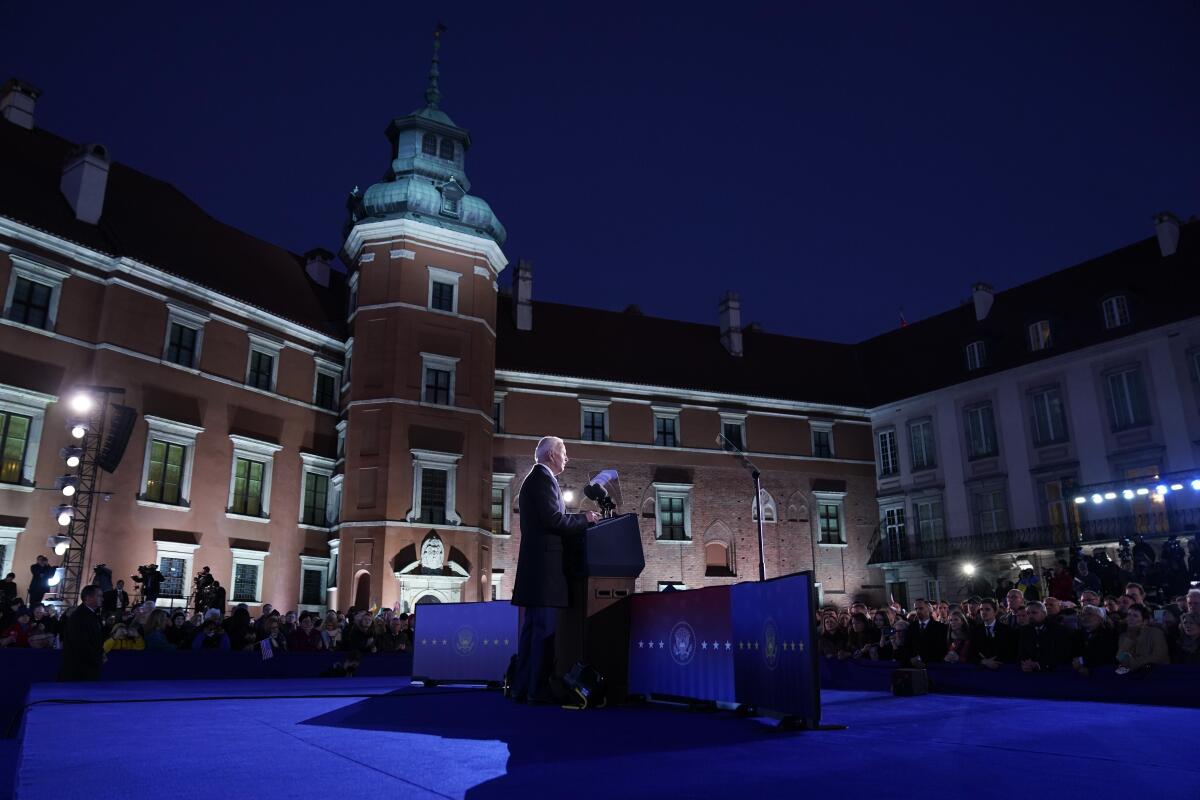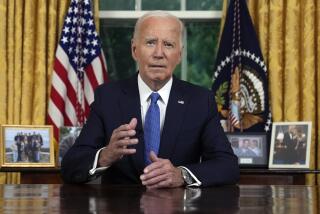Biden’s gaffes should not drive U.S. policies on Russia

- Share via
An enormous amount of effort and planning went into crafting a single coherent message and in one instant it was all for naught. I’m not talking about Will Smith slapping Chris Rock during Sunday night’s Oscars, but President Biden’s similarly unscripted call for regime change in Russia.
In Warsaw on Saturday, Biden delivered a speech intended to underscore NATO’s resolve and America’s leadership in the Ukraine crisis. When he was done, Biden ad-libbed nine words that sent allied governments — and White House aides — into a frenzy: “For God’s sake, this man cannot remain in power.”
In one sense, I’m sympathetic. Everyone, especially Ukrainians and Russians, would be better off if Russian President Vladimir Putin wasn’t in power. He’s a force for evil and hostile to America and our values. Graded morally and emotionally, Biden’s outburst was a classic “Kinsley gaffe” — named after Michael Kinsley, who said, “A gaffe is when a politician tells the truth — some obvious truth he isn’t supposed to say.”
But because Biden’s heart was in the right place a lot of people are denying that his mouth wasn’t.
It’s difficult to exaggerate the suddenness and significance of the change in attitudes — and policies — wrought by Russia’s indefensible invasion of Ukraine.
Much of it has to do with America’s Trump hangover. For instance, the Washington Post’s Max Boot rushed to Biden’s defense, writing that Biden’s speech was “pitch-perfect” while Donald Trump’s 2017 Warsaw speech was a horror. He acknowledges that Biden’s nine words were a gaffe, but thinks history might vindicate the president the way it vindicated Ronald Reagan’s attack on the Soviet Union as an “evil empire” in 1983. Boot concludes, “I would rather have a president who is fearless in calling out Putin’s war crimes than one who toadies to the Russian tyrant.”
Unfortunately, none of this is really a defense. “What about Trump?” is no more a defense of Biden’s mistakes than “What about Obama?” was a defense of Trump’s. If two wrongs don’t make a right, neither do Trump’s (myriad) mistakes make Biden’s gaffe savvy.
Similarly, the whole point of his prepared remarks, no doubt crafted in consultation with allies, was to signal not just NATO’s unified resolve, but Biden’s surefootedness in this crisis. The ad-libbed bit contradicted or overshadowed the allegedly perfect pitch — by unsettling allies in the North Atlantic Treaty Organization and bolstering Russian propaganda. How “fearless” can Biden’s remarks be if they were walked back for fear people took him literally?
Simply put this wasn’t a Kinsley gaffe in the way that matters most: It wasn’t policy. When Reagan said the U.S.S.R. was an “evil empire,” it was a deliberate statement. The opposite is true here.
The more fundamental problem isn’t one gaffe, but a whole pattern. Biden told the 82nd Airborne forces stationed in Poland that they’d see the devastation in Ukraine “when you’re there.” Aides had to clarify that U.S. troops would not, in fact, be going to Ukraine. Biden also said in Warsaw that we would respond “in kind” if Russia used chemical weapons. Nope, clarified national security advisor Jake Sullivan.
Overlooked in the days since Trump’s celebration of Putin’s invasion of Ukraine is how wrong Trump was about the man he claims to know “very, very well.”
Biden long ago acknowledged he was a “gaffe machine” and throughout his presidency the White House has had to correct the plain meaning of his utterances. Asked about an incident when activists chased Sen. Kyrsten Sinema (D-Ariz.) into a bathroom, Biden said, “I don’t think they’re appropriate tactics, but it happens to everybody.... It’s part of the process.” White House Press Secretary Jen Psaki subsequently tried to convince the press his real position was that “he believes that what happened to her crossed the line and was absolutely unacceptable and flat out wrong to violate someone’s personal space in a bathroom.”
From suggesting the 2022 midterm election results would be illegitimate if his election reforms failed to pass, to implying that a “minor incursion” into Ukraine by Russia wouldn’t be that big a deal, there are now dozens of examples of the administration retconning Biden’s verbal stumbles.
But what’s more worrisome than denying the reality of Biden’s verbal mistakes is making his verbal mistakes reality.
For instance, initially the White House was rightly careful to not call Putin a war criminal not because he isn’t one — he obviously is — but because saying so has profound policy implications. The policy suddenly changed when Biden responded off the cuff to a shouted question from a reporter, saying, “I think he is a war criminal.”
At first Psaki said Biden was merely “speaking from his heart.” But soon it became the administration’s official position.
I’m open to that position, but on this and many other issues, I’d like America’s policies to be informed by something more deliberate and considered than a gaffe.
More to Read
A cure for the common opinion
Get thought-provoking perspectives with our weekly newsletter.
You may occasionally receive promotional content from the Los Angeles Times.












